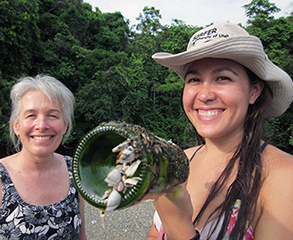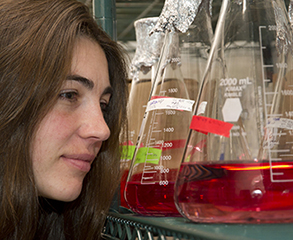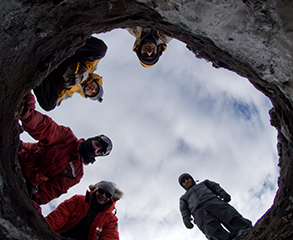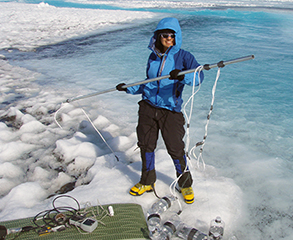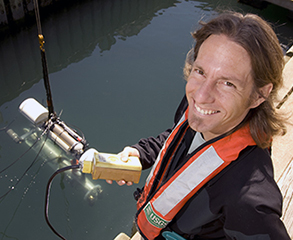Fields of Study
The ocean is one of the most magnificent and important features on our planet and offers a wealth of opportunities for exploration and discovery. Ocean scientists include physicists, chemists, geologists, biologists and mathematicians, which often work together in teams to solve the challenges posed by the complicated ocean environment. As an ocean scientist you might make new discoveries about how ocean waters move, how the ocean and atmosphere work together to control climate, or you may better understand earthquakes, discover new species, biochemical processes or geological features. As an ocean engineer you might design, build, and operate robotic vehicles to support scientific investigations, contribute to national defense, or find employment in the offshore oil and gas industry. Ocean policy to mitigate the effects of human activities on the ocean and to preserve its living resources is developed by economists, lawyers, managers, and others working with scientists and engineers.
The health of our oceans is key to the health and future habitability of our planet. Choose a career in ocean.
Biology
Ocean Biologists (biological oceanographers, marine biologists) study relations between living organisms in the ocean and the ocean environment in which they dwell. Students may choose from a wide variety of specializations including specific organism groups such as microbes, phytoplankton, zooplankton, fish, and mammals as well as broader linkages to the ecology of organism groups or ecosystems.
Chemistry
Ocean chemists (chemical oceanographers) study the chemical composition of seawater and how it is affected by physical mixing processes and by interactions with the atmosphere, the biosphere, and the seafloor sediments and rocks. Students may specialize in the organic or physical chemistry of seawater and sediments, photochemical reactions in seawater, air-sea chemical interactions, and the biogeochemical cycling of elements such as carbon, sulfur, and nitrogen.
Physics
Ocean physicists (physical oceanographers) want to understand ocean currents and mixing: why, where, and how water moves, as well as the consequences of these movements. Some physical oceanographers are theoreticians and study the ocean with equations and computer models. Others make observations from ships, autonomous vehicles and, increasingly, from satellite observations. An important new emphasis in physical oceanography is to better understand the role of the ocean in global climate and climate change.
Engineering
Engineers solve problems in the ocean environment. Ocean engineers include mechanical, electrical, chemical and civil engineers. Among other contributions, ocean engineers have invented thousands of instruments and devices to make measurements in the ocean with a major impact on ocean science. Examples include: computer- and satellite-linked buoys and floats, sediment traps, ocean seismometers, underwater video equipment, and acoustic measuring devices (instruments that make it possible to "sense" underwater objects and seafloor formations). Ocean robotics is a rapidly growing field, and various types of autonomous vehicles support scientific investigations, contribute to national defense, and provide essential support for the offshore oil and gas industry.
Geology & Geophysics
Ocean geologists (geological oceanographers) study seafloor features and the rocks and sediments that comprise these features. By combining their knowledge of marine chemistry and physical oceanography, marine geologists help piece together information about how the Earth formed and how the movement of plates and continents results in events such as volcanoes and earthquakes. By examining the distribution of microfossils in cores collected from the seafloor, paleoclimatologists seek to understand past changes in the Earth’s climate and the causes for those changes. Coastal geologists study beach erosion, effects of sea level change on coastal environments, the fate of sediments entering the ocean from rivers, and the impacts of ground water entering the coastal ocean.
Mathematics
Applied mathematics is a particularly useful field for making advances in theoretical physical oceanography, geophysics and theoretical marine ecology.
Cross-Disciplinary
An aspect of oceanography which is attractive to all involved is the inter-disciplinary nature. To study oceanography requires an individual to learn the basics of biology, chemistry, geology, physics and mathematics. Although one may specialize in a particular discipline, it is inevitable that aspects of other disciplines will be involved, or it will require collaborating with experts in other disciplines to fully understand a problem.
Other
When envisioning a career involving the ocean, many people think of people swimming with whales or dolphins, living on a ship, or tending to fishes in an aquarium. While those activities can be a reality, there are several disciplines associated with studying the ocean that people do not realize, such as robotics, mathematics, and computer science.

